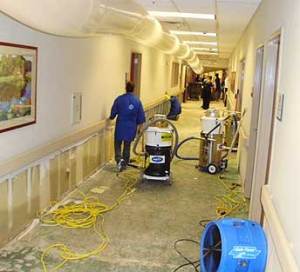“…Employers only have to pay emÂÂployees for hours actually worked, unless they have a collective bargaining agreement or contractual arrangement that says otherwise. Normally, employees are not entitled to pay for  work that was scheduled, but did not occur because of the disaster…Floods and other natural disasters may bring allergens and pollutants to the workplace, triggering possible ADA accommodations. Employees may need time off under the FMLA…”
work that was scheduled, but did not occur because of the disaster…Floods and other natural disasters may bring allergens and pollutants to the workplace, triggering possible ADA accommodations. Employees may need time off under the FMLA…”
When Hurricane Sandy roared up the East Coast in October, it brought immense destruction to heavily populated areas. Similarly, the June 2012 derecho storm that tore through the Midwest and Mid-Atlantic produced destructive winds and at least one tornado. People in the Midwest and the South are still dealing with prolonged drought.
All brought business to at least a temporary standstill. Employers must be prepared for a variety of disaster scenarios. And while they focus on getting up and running again, they must still comply with federal emÂÂployÂÂment laws.
THE LAW: The Fair Labor Standards Act (FLSA) sets strict wage-and-hour requirements for paying employees—regardless of how high the water rises. Floods and other natural disasters may bring allergens and pollutants to the workplace, triggering possible ADA accommodations. Employees may need time off under the FMLA.
Employers that must clean up their facilities may face hazards requiring worker protections under the Occupational Safety and Health Act.
WHAT’S NEW: In the wake of HurÂÂricane Sandy, the U.S. DepartÂÂment of Labor has launched a disaster preÂÂparedness page with guidance and contact information for both employers and employees.
Additionally, OSHA provides countÂÂless resources on handling flood and cleanup hazards in its Fact Sheet on Natural Disaster Recovery.
HOW TO COMPLY: Employers must deal with two very practical matters in the aftermath of a natural disaster: workplace cleanup and paying workers. Federal law affects both.
Cleaning up
A major disaster changes the workplace’s entire environment. Power may be out, gas lines may have ruptured, overhead electrical wires may be dangling. All can be deadly.
Cleanup is hard work. OSHA adÂÂvises cleanup crews to use good lifting techniques and take frequent breaks. When lifting heavy objects, employees should work in teams so no one has to lift more than 50 pounds alone.
Make first aid kits readily available. Provide training so employees know how to prevent infection by cleaning and protecting cuts and abrasions. ProÂÂtective clothing should include watertight boots with steel toes and insoles, long pants, safety glasses and a hard hat if there’s a danger of falling debris.
If cleanup crews encounter mold, they should wear respirators approved by the National Institute for Occupational Safety and Health.
When handling hazardous chemicals, employees must follow specific instructions for protective clothing.
When moving ladders or scaffolds, make sure employees know to watch for low-hanging power lines. When connecting generators to active power systems, instruct them to shut down and lock main breakers to prevent energizing outside power lines on which utility workers may be working. Have expert electricians inspect lines that are damaged or submerged.
Similarly, if anyone detects a gas leak, ensure they know to evacuate the building and notify utility crews.
FLSA issues
Natural disasters can wreak havoc on payroll operations. Maintain redundant systems to avoid losing payroll records and preserve the ability to issue paychecks. Many payroll companies offer cloud or offsite storage of wage-and-hour data so even if your facility is damaged or destroyed, existing payroll information is preserved.
Generally, employers must meet regularly scheduled paydays, but disasters have a way of upsetting normal routines. Employers that anticipate having difficulty meeting payroll should contact the DOL’s Wage and Hour DiviÂÂsion at (866) 4USWAGE (487-9243) for guidance.
For more:Â http://www.businessmanagementdaily.com/34280/disaster-averted-make-emergency-preparedness-part-of-your-job
 restaurant’s walls were left standing, but the interior was gutted…”
restaurant’s walls were left standing, but the interior was gutted…”






